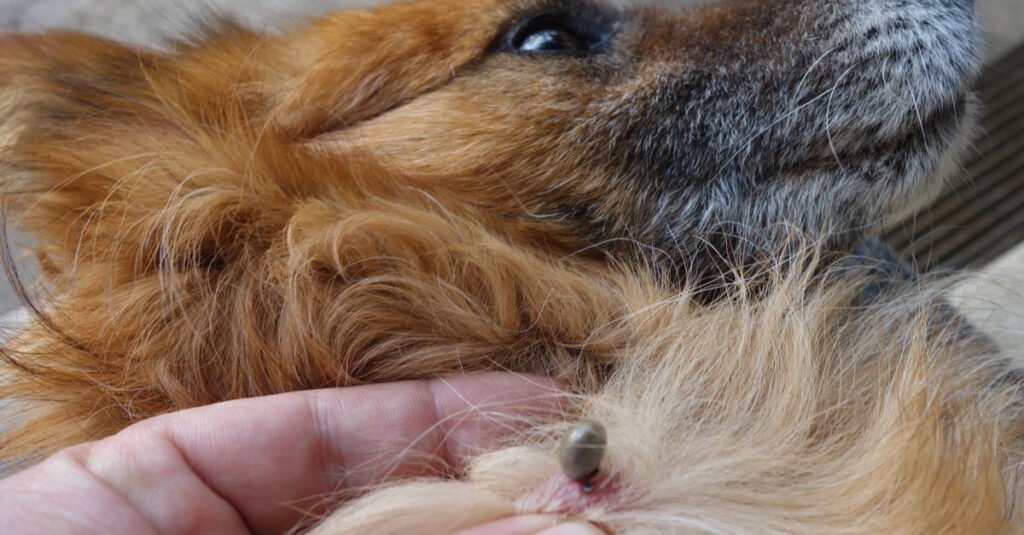Ticks are pesky parasites that can infest your dog and transmit various diseases, such as Lyme disease, ehrlichiosis, tularemia, and Rocky Mountain Spotted Fever. Therefore, it is important to know how to prevent, detect, and remove ticks from your dog effectively and safely.
Table of Contents
One product that you may have heard of is Dettol, a disinfectant and antiseptic that can kill ticks on dogs. However, is Dettol safe to use on dogs? How should you use it? What are some better alternatives? In this guide, we will answer these questions and more, providing you with a thorough understanding and mastery of the subject.
Can Dettol Kill Ticks on Dogs?
The short answer is yes, but with some caveats. Dettol can kill ticks on dogs by causing them to die on contact. One of its active ingredients is phenol chloroxylenol, which is deemed toxic when ingested. It can also cause skin irritation and allergic reactions in dogs. Moreover, it can injure your pet as well as cause the tick to secrete more toxin.
Also Read: Best Homemade Treatment for Ticks after Detecting on Dog’s Body
However, small amounts of Dettol have been used on dogs, but we recommend safer options such as flea and tick shampoos or collars instead. Dettol may not be suitable for all dogs, especially cats, who are more susceptible to the harsh side effects of ingesting or inhaling Dettol.
The Science Behind Dettol and Ticks
When it comes to protecting our furry friends from parasites, the use of Dettol® as a disinfectant can be a topic of interest for many pet owners. In the context of ticks, which are a common concern for dog owners, it’s important to understand the effectiveness of various treatments.
Selamectin is a well-known medication that targets a range of parasites including fleas, lice, ticks, and even prevents heartworm. It also controls hookworms and ascarids to some extent. For young pets like puppies and kittens, pyrantel pamoate is recommended every two weeks, typically during their vaccination schedule, to combat these parasites.
Research indicates that certain substances can effectively eliminate hookworm larvae. These include strong sunlight, 50 ppm aqueous iodine, water heated above 80°C, 70% ethanol, and notably, Dettol®. However, ascarid eggs are notably tough and resist most disinfectants. Therefore, it’s crucial to first remove all feces from areas where pets reside, such as pens, runs, and kennels. This should be followed by thorough cleaning, which significantly reduces the risk of re-infection and protects both pets and shelter staff.
While standard shelter sanitation methods like using accelerated hydrogen peroxide can eradicate viruses, bacteria, and fungi, they may not be effective against hookworm larvae or ascarid eggs. Nonetheless, general cleaning is essential for removing all major parasite life stages from the environment, including those of dermatophytes.
In the case of ticks on dogs, while Dettol® is effective against hookworm larvae, there is no direct evidence suggesting its efficacy against ticks. It’s always best to consult with a veterinarian for the most appropriate and safe tick prevention and treatment methods for your dog. For example, a vet might recommend a tick-specific treatment like a spot-on medication, oral tablet, or a tick collar, rather than a general disinfectant like Dettol®.
Remember, the safety and health of your pet should always come first. Using products not specifically designed for animals can be harmful, so it’s essential to use only vet-approved treatments for tick control on dogs.
How to Use Dettol on Dogs?

If you decide to use Dettol on dogs, you should do so with caution and monitor the dog for any adverse reactions. You can use Dettol to kill ticks around your home by spraying it generously all over indoor spaces. You can also create a diluted dose of Dettol and apply it on your dog when the tick is still on the dog, but it’s better to remove the tick first.
Here is a table that summarizes how to use Dettol on dogs:
| Method | Steps |
|---|---|
| Spraying around the home | – Spray Dettol generously all over indoor spaces <br> – Avoid spraying directly on your dog or their fur |
| Applying diluted dose | – Mix water and Dettol Antiseptic Disinfectant Liquid in a ratio of 1:10 <br> – Apply the diluted dose on your dog when the tick is still on the dog |
What are Some Better Alternatives to Dettol?
While Dettol can kill ticks on dogs, it is not the only or best option available. There are safer and more effective ways to prevent and treat ticks on your dog, such as:
- Flea and tick shampoos or collars
- Tweezers
- Essential oils or herbs
- Veterinary care
We will discuss these alternatives in more detail in the following sections.
Conclusion
In this guide, we have covered everything you need to know about can Dettol kill ticks on dogs. We have explained how Dettol works, how to use it safely, and what are some better alternatives. We have also provided you with a comprehensive list of products and methods that can help you prevent and treat ticks on your dog effectively and safely.
We hope this guide has been helpful and informative for you and your dog. Remember, ticks are dangerous parasites that can cause serious health problems for your dog and yourself. Therefore, it is important to take preventive measures and act quickly if you encounter a tick on your dog.

